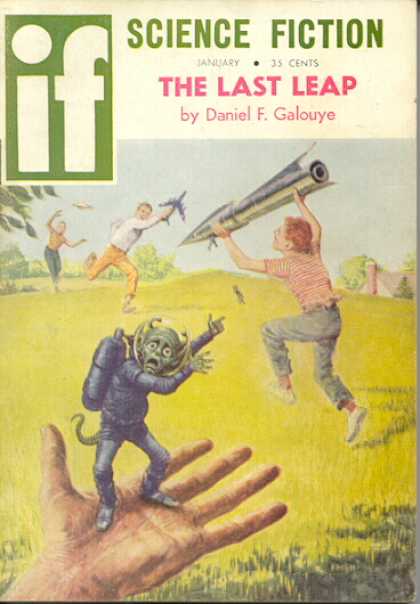Without preamble, let's get to the second half of this month's Galaxy, the June 1960 issue. I hope you've all been reading along with me because there will be a quiz next period.

by Wood
Jack Sharkey is a prolific newcomer who started out in the lesser mags. His The Dope on Mars, the first-hand account of a journalist sent to the Red Planet, is fair. The title actually is a clever (if intentional) pun, as it suggests both the true story about Mars and the moron sent to cover it. And that's ultimately what I found frustrating—the reporter really comes off as a putz. On the other hand, recalling my competition back in my reporting days, perhaps the depiction isn't that far off the mark.

Transstar is a dense novelette, and is the first thing by Raymond Banks that I've really enjoyed. In fact, were it not for the slightly disappointing ending, it would have earned the coveted 5-star award. In the far future, humanity has spread across a thousand star systems. Protecting it is the extra-governmental agency, Transstar, with millions of ships at its disposal. This overwhelming force comes with a hefty price tag, however, and partial mobilization does not appear to be an option. This sounds implausible on its face, but recall that the French mobilization of the last war had similar problems, which was one of the reasons there was no armed resistance to the German taking of the Rhineland in '36.
Despite the massive scope of the backdrop, Transstar is a very personal story, that of one agent stationed at a small colony that happens to be next in line for conquest by the sadistic Eaber, who also have a thousand systems under their control. The story is by turns poignant and horrifying, written in an excellent, understated fashion. My only issues are with the ending, which was both too glib and somewhat inconsistent. But I'll save the rest of my commentary for the letter column.

by Dillon
I remember Charles de Vet largely from his propping up the rather dismal January 1959 Astounding. Monkey on his Back, de Vet's contribution to this month's Galaxy is an interesting adventure story. Imagine if Harrison's Slippery Jim diGriz suddenly got amnesia and went to a shrink for help.

Fredric Brown's Beware Earthmen Bearing Gifts is over almost before it starts. Taken at face value, it's a silly premise, but there are two valid themes conveyed: the principle that nothing can be observed without affecting it, and, our methods of exploration may be more destructive than necessary.

by Dillon
Idea Man, by British neophyte John Rackham (who wrote the lead story for the November 1959 issue of IF) has a fun piece on what it's like to have a great concept but limited vision for its application.

by Dillon
Finally, we have Inside John Barth, by the brand new William W. Stuart (I'm seeing a trend; ever since lowering his rates, editor Gold is having trouble getting old pros to work for him). It's a rather fascinating tale about a fellow who becomes a colony (in the 17th century sense of the word) for a clan of aliens. Their relation is symbiotic, for the most part, though the "host" increasingly resents the salutary restrictions placed on his activities to ensure the benevolence of his internal environment. A good first effort, for sure.
So there you have it: a solid 3-star issue (sadly, with nary a female writer nor much of a female character presence). Let me know what you think, and I'll see y'all in a few days!


